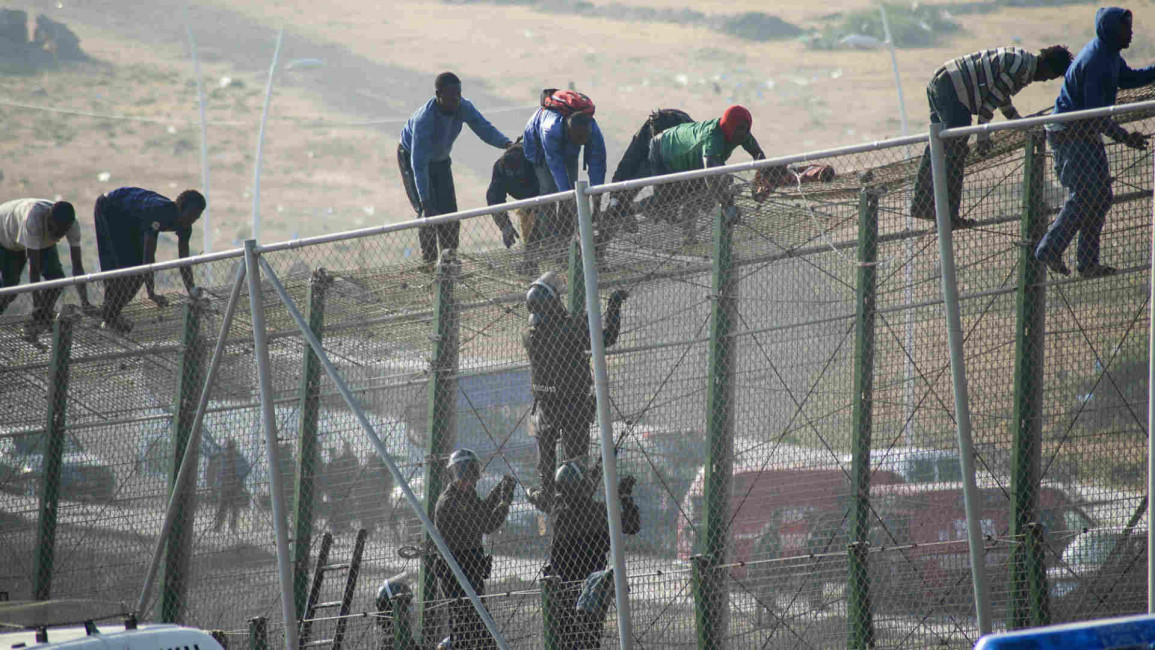More than 200 migrants storm Morocco-Spain border at Melilla
A total of 209 people from sub-Saharan Africa seeking to reach Europe scaled the fence on Saturday afternoon, the central government's representative office in Melilla said in a statement.
The police officer who was injured was "attacked by an immigrant with one of the hooks they use to clamber up the fence" as he tried to stop them, the statement said, adding the implement cut his earlobe.
In order to get across the treacherously high fences, migrants often use hooks and shoes studded with nails.
Four of the migrants, meanwhile, were sent to hospital for minor injuries, it added.
Mobile phone footage broadcast by Spanish media showed a group of migrants running through the streets of the city.
They have since been taken to a migrant detention centre.
Twitter Post
|
The border barrier separating Morocco from the tiny enclave of Melilla is one of the most heavily fortified in the world. It is composed of multiple six-metre-high fences, webs of barbed wire and ditches, with frequent surveillance post that video monitor the entire length of the border.
Melilla and Ceuta, another Spanish enclave nearly 400 kilometres (250 miles) away on the north coast of Africa, are often used as entry points into Europe for African migrants.
They have the only two land borders between Africa and the European Union.
There are reported to be several makeshift camps in the forests surrounding the border to Melilla, where migrants assemble in order to plan their collective attempts at storming the border, which requires large groups of them so they can overpower the border guards.
 |
|
| Over the years, thousands of migrants have attempted to cross the 12-kilometre (7.5 mile) frontier between Melilla and Morocco [Getty] |
Despite most of the migrants being stopped immediately, some of the large group will manage to break away and run to Spanish territory, as the border guards will be overwhelmed by the sheer number of migrants.
Many of the migrants, most of them young men, get critically injured or even die during the precarious and physically demanding process.
The dangerous tactic is used mostly by migrants from sub-Saharan Africa, as they cannot claim asylum in Europe at the border directly, in the way that Syrian refugees can.
Melilla border heavily fortified in 2014 in wake of migrant crisis, which caused the number of attempts to scale the fence fall by 67 percent, according to Vox.
Morocco's military is also heavily invested in stopping migrants from crossing into the Spanish territory, due to an agreement with Europe Union names the Advanced Status Partnership.
Through the partnership, Morocco is incentivised to stay on good terms with the EU by enforcing strict border control, in return for billions of euros in security and development aid, as well as economic and trade advantages.
Moroccan authorities have began to frequently raid the forest camps where migrants reside, harassing migrants and destroying tents, in a campaign of intimidation, which has drawn complaints from human rights organisations.
Once a month, the authorities round up the migrants and send them to other regions of Morocco, in order to disable them from forming groups large enough to storm the border successfully.
Over the years, thousands of migrants have attempted to cross the 12-kilometre (7.5 mile) frontier between Melilla and Morocco, or the eight-kilometre border at Ceuta, by climbing the border fences, swimming along the coast or hiding in vehicles.
Spain is increasingly targeted by people desperately fleeing conflicts, oppression and poverty in Africa, with the number of migrants reaching the country in 2017 hitting a record high of nearly 22,900, according to EU border agency Frontex.
This was more than double the previous record set in 2016.



